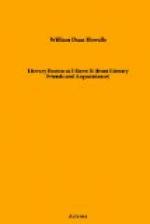IV.
But when I came to Boston early in 1866, the ‘Atlantic Monthly’ and ‘Harper’s’ then divided our magazine world between them; the ’North American Review’, in the control of Lowell and Professor Norton, had entered upon a new life; ‘Every Saturday’ was an instant success in the charge of Mr. Aldrich, who was by taste and training one of the best editors; and ‘Our Young Folks’ had the field of juvenile periodical literature to itself.
It was under the direction of Miss Lucy Larcom and of Mr. J. T. Trowbridge, who had come from western New York, where he was born, and must be noted as one of the first returners from the setting to the rising sun. He naturalized himself in Boston in his later boyhood, and he still breathes Boston air, where he dwells in the street called Pleasant, on the shore of Spy Pond, at Arlington, and still weaves the magic web of his satisfying stories for boys. He merges in their popularity the fame of a poet which I do not think will always suffer that eclipse, for his poems show him to have looked deeply into the heart of common humanity, with a true and tender sense of it.
Miss Larcom scarcely seemed to change from date to date in the generation that elapsed between the time I first saw her and the time I saw her last, a year or two before her death. A goodness looked out of her comely face, which made me think of the Madonna’s in Titian’s “Assumption,” and her whole aspect expressed a mild and friendly spirit which I find it hard to put in words. She was never of the fine world of literature; she dwelt where she was born, in that unfashionable Beverly which is not Beverly Farms, and was of a simple, sea-faring, God-fearing race, as she has told in one of the loveliest autobiographies I know, “A New England Girlhood.” She was the author of many poems, whose number she constantly enlarged, but she was chiefly, and will be most lastingly, famed for the one poem, ‘Hannah Binding Shoes’, which years before my days in Boston had made her so widely known. She never again struck so deep or so true a note; but if one has lodged such a note in the ear of time, it is enough; and if we are to speak of eternity, one might very well hold up one’s head in the fields of asphodel, if one could say to the great others there, “I wrote Hannah Binding Shoes.” Her poem is very, very sad, as all who have read it will remember; but Miss Larcom herself was above everything cheerful, and she had a laugh of mellow richness which willingly made itself heard. She was not only of true New England stock, and a Boston author by right of race, but she came up to that city every winter from her native town.




